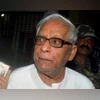Buddhadeb Bhattacharjee, a seasoned leader of the Left and former Chief Minister of West Bengal, passed away this morning at his residence in south Kolkata. He was 80 years old. Bhattacharjee had been dealing with health issues for some time, particularly respiratory problems that led to frequent hospital stays. Last year, he was placed on life support due to pneumonia, but he managed to recover.
Bhattacharjee's political journey was significant. He served as the Chief Minister of West Bengal from 2000 to 2011, taking over from Jyoti Basu. During his tenure, he was also a member of the Communist Party of India (Marxist)'s Politburo, the party's highest decision-making body. In the 2011 state elections, he led the CPI(M) but was defeated by Mamata Banerjee's Trinamool Congress, which ended the 34-year Communist rule in the state.
Life of CPI(M) veteran Buddhadeb Bhattacharjee
Born on March 1, 1944, in Kolkata, Buddhadeb Bhattacharjee completed his schooling at Sailendra Sarkar Vidyalaya and earned a Bachelor of Arts degree in Bengali from Presidency College in 1964. His academic background laid the foundation for his later pursuits in literature and politics, where he was recognised not only as a politician but also as a poet, columnist, and orator.
Venture into politics
Bhattacharjee began his political career in 1966 by joining the Communist Party of India (Marxist). He was first elected as a Member of the Legislative Assembly (MLA) from the Cossipore constituency in 1977 and later represented Jadavpur from 1987 until 2011. He held various positions within the party, including Deputy Chief Minister, before becoming Chief Minister in 2000. His administration focused on industrialising West Bengal, exemplified by a contentious deal with Tata Motors for the Nano car project, which faced substantial opposition in Singur and Nandigram.
As a member of the Politburo from 2002 to 2015, Bhattacharjee's leadership was marked by efforts in land reforms and urban development, though it also faced significant criticism for its handling of protests and social issues.
West Bengal under Bhattacharjee
Buddhadeb Bhattacharjee's tenure as Chief Minister was marked by several notable achievements. He spearheaded an ambitious push for industrialisation, aiming to shift West Bengal's economy from agrarian to industrial. His policies attracted significant investments from major corporations like Tata Motors, which established the Nano car manufacturing plant in Singur.
More From This Section
Other notable projects included the Jindal group's plan to build the country's largest integrated steel plant in Salboni, West Midnapore, and a chemical hub in Nayachar after facing resistance in Nandigram.
Additionally, Bhattacharjee was a strong advocate for education, implementing reforms to improve educational quality by establishing new schools, colleges, and universities, and launching initiatives to enhance teaching standards. His love for arts and culture was evident in his promotion of cultural activities and support for the Bengali film industry, earning him admiration from the artistic community for his efforts to preserve and promote Bengal's rich cultural heritage.
The blot of Nandigram violence
However, Bhattacharjee's tenure was also marred by significant controversies. His leadership style often drew allegations of authoritarianism, with critics accusing him of being dismissive of dissent and using heavy-handed tactics to quell opposition, particularly during the Nandigram and Singur incidents.
The most notable was the violent clash in Nandigram in 2007, where the government's attempt to acquire land for a Special Economic Zone (SEZ) led to widespread protests by local farmers and residents. The ensuing violence resulted in numerous deaths and injuries, severely tarnishing Bhattacharjee's reputation and sparking nationwide criticism.
In 2006, the West Bengal government announced the Tata Nano factory in Singur, promising economic development and job creation. However, the land designated for the factory was highly fertile and crucial for the livelihoods of many local farmers. The government's acquisition of this land was executed under the colonial-era Land Acquisition Act of 1894, which faced criticism for its outdated provisions and the manner in which it was applied. Many farmers received inadequate compensation, leading to widespread discontent and protests organised by the Trinamool Congress (TMC) and other groups.
On March 14, 2007, at least 14 villagers, including two women, were killed in police firing when they were protesting against the proposed land acquisition. The killings sparked a violent agitation that lasted over one and a half years.
The Bhumi Uchched Pratirodh Committee (BUPC), supported by opposition parties like TMC, led the resistance against land acquisition in Nandigram. CPI(M) supporters were driven out of the area and their houses were reportedly burnt by the BUPC.
On October 3, 2008, Tata Motors officially announced its decision to leave Singur, citing the untenable situation created by the protests and political opposition.
The demise of Communists in West Bengal
The Nandigram violence had far-reaching implications for the Left Front government. It brought the issue of forcible land acquisition to the forefront of Bengal politics and hastened the end of the Left Front's rule in the 2011 state elections. The controversy also led to a shift in government policy regarding land acquisition for industrial projects.
Under his leadership, the Left Front, which had ruled West Bengal for over three decades, suffered a significant decline, culminating in the 2011 state elections where they were ousted by the TMC led by Mamata Banerjee. This marked the end of an era and was seen as a reflection of public dissatisfaction with Bhattacharjee's policies and governance.
In 2022, Bhattacharjee again made headlines by refusing the Padma Bhushan award from the Modi government. This decision was seen as a reflection of his political principles and the CPI(M)'s historical stance against accepting state honours. His refusal was particularly notable given the political context, as it was perceived as a rejection of the BJP's attempts to co-opt his legacy for electoral gain in West Bengal.

)